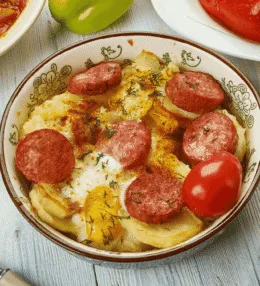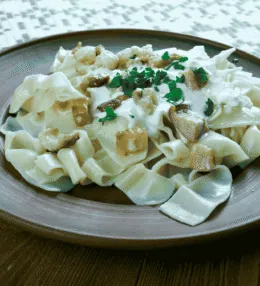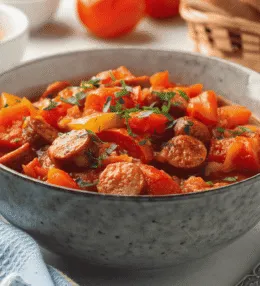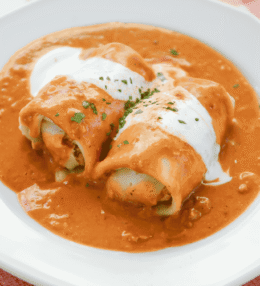
- View
Table of Contents
ToggleChanfana is one of Portugal’s most deeply rooted rustic dishes, beloved for its bold flavours and slow cooked richness. Traditionally made with goat, this hearty stew is steeped in red wine, herbs, and garlic, transforming tough meat into something tender and deeply flavourful.
It is a dish that speaks of community and patience, often prepared for family gatherings or village celebrations. Each slow simmering hour builds layers of taste, making Chanfana as much about the process as the result.
While you can find it in restaurants across Portugal, its soul lies in the countryside kitchens where it is still cooked in clay pots over wood fires. Here, it remains both a meal and a piece of living heritage.
Want to dive deeper into Portuguese Cuisine? Don’t miss our post on 38 Traditional Portuguese Foods to Try
What Is Chanfana?
Chanfana is a slow cooked stew made from older goat meat, which is tougher but richer in flavour. The meat is marinated in red wine and garlic, then cooked slowly until it reaches a melt-in-the-mouth tenderness.
The method is simple but precise, using the wine not only to soften the meat but also to give it a deep, almost smoky richness. Bay leaves, onions, and lard or olive oil round out the base.
Served hot and hearty, it is often paired with crusty bread, boiled potatoes, or rice, allowing the rich sauce to be savoured down to the last drop. Every bite is warming and deeply satisfying.
Ingredients and Taste
The main ingredient is mature goat, chosen for its stronger, more complex flavour. Red wine, often from the same region where the dish is made, forms the backbone of the marinade and cooking liquid.
Garlic, onions, bay leaves, and a touch of paprika bring aromatic depth. Lard or olive oil adds richness, while slow cooking allows the meat to absorb every nuance of the marinade.
The taste is robust and layered. The wine gives a slight acidity and fruitiness, the garlic brings warmth, and the herbs offer a grounding, earthy note. The result is bold without being overwhelming.
A Taste of History
Chanfana’s origins lie in rural Portugal, especially in the Beiras region, where goat farming has long been part of local life. The dish made use of older animals, which needed long, slow cooking to become tender.
It is said that nuns in the convents first popularised the recipe, using wine both for preservation and flavour. Over time, Chanfana became a festive dish, especially during winter celebrations and village feasts.
The clay pots traditionally used to cook it gave the stew a distinct character, holding heat evenly and adding a rustic charm. In some villages, these pots are still passed down through generations.
Today, Chanfana remains a proud symbol of Portuguese culinary tradition. It bridges the gap between necessity and indulgence, turning humble ingredients into a dish worthy of celebration and memory.
How to Make Chanfana (Goat Stew in Red Wine)
Chanfana is a rustic Portuguese stew of goat slow braised in red wine with garlic, spices, and bay leaves until meltingly tender. Traditionally cooked in a clay pot in wood fired ovens, it delivers deep, earthy flavours with a velvety sauce. The secret lies in slow cooking and generous seasoning. See the recipe card at the bottom for printable directions
Ingredients
For the stew
- 1.5 kg goat meat (bone-in, cut into large chunks)
- 750 ml robust red wine (preferably Portuguese Dão or Bairrada)
- 8 garlic cloves, crushed
- 3 bay leaves
- 1 large onion, sliced
- 100 g smoked bacon, diced
- 2 tbsp lard or olive oil
- 1 tsp paprika
- 1 tsp ground black pepper
- 1 tbsp coarse sea salt
- 1 sprig fresh rosemary (optional)
- 1–2 dried chillies (optional, for gentle heat)
Cooking Instructions
Step 1: Prepare the marinade
To begin, place the goat pieces in a large non-reactive bowl or clay pot. Add garlic, bay leaves, paprika, pepper, and salt. Pour over the red wine, ensuring the meat is fully submerged. Cover and refrigerate for at least 12 hours, ideally overnight, to allow the wine and spices to penetrate. Proceed to preheating the oven.
Step 2: Preheat and prepare cooking vessel
Preheat your oven to 160°C. If using a traditional clay pot, soak it in water for 20 minutes before use to prevent cracking. Move to cooking aromatics.
Step 3: Sauté the bacon and onion
In a large ovenproof pot or clay vessel, melt the lard (or warm olive oil) over medium heat. Add bacon and cook until it begins to render its fat, then add the sliced onion and cook until soft and translucent. Transition to adding the marinated meat.
Step 4: Add the goat and marinade
Lift the goat pieces from the marinade and place them into the pot, browning lightly for added depth of flavour. Pour in the marinade, including garlic and bay leaves. Add rosemary and dried chillies if using. Proceed to covering and baking.
Step 5: Slow bake the stew
Cover the pot tightly with a lid or foil to trap moisture. Transfer to the oven and cook for 3–4 hours, checking occasionally to ensure the meat remains mostly submerged. Continue until the goat is fork tender. Move to final seasoning.
Step 6: Adjust seasoning and sauce
Remove from the oven, taste the sauce, and adjust seasoning with salt or pepper if needed. If the sauce is too thin, reduce it slightly over low heat on the hob. Prepare to serve.
Final Step: Serve hot
Serve Chanfana in its cooking pot for a rustic presentation. Traditionally paired with boiled potatoes, crusty bread, or rice to soak up the rich wine sauce. Garnish with fresh parsley for a touch of brightness.
Variations and substitutions
- Meat substitution: Lamb can replace goat where goat is difficult to source.
- Fat substitution: Lard gives authenticity, but olive oil is a suitable alternative.
- Wine substitution: Any full bodied red wine works, but Portuguese wines like Dão or Bairrada maintain traditional flavour.
- Clay pot alternative: A heavy cast iron Dutch oven can replace the clay pot if unavailable.
Cooking Tips for Perfect Chanfana
- Use mature goat for the richest flavour and texture.
- Marinate overnight to deepen flavour and tenderise the meat.
- Avoid rushing the slow cooking process; it allows the meat to absorb the wine and spices fully.
- Serve in a warmed pot to maintain heat at the table.

Portuguese Chanfana (Goat Stew in Red Wine)
Ingredients
- 1.5 kg goat meat bone-in, cut into large chunks
- 750 ml robust red wine preferably Portuguese Dão or Bairrada
- 8 garlic cloves crushed
- 3 bay leaves
- 1 large onion sliced
- 100 g smoked bacon diced
- 2 tbsp lard or olive oil
- 1 tsp paprika
- 1 tsp ground black pepper
- 1 tbsp coarse sea salt
- 1 sprig fresh rosemary optional
- 1 –2 dried chillies optional, for gentle heat
Instructions
- To begin, place the goat pieces in a large non-reactive bowl or clay pot. Add garlic, bay leaves, paprika, pepper, and salt. Pour over the red wine, ensuring the meat is fully submerged. Cover and refrigerate for at least 12 hours, ideally overnight, to allow the wine and spices to penetrate. Proceed to preheating the oven.
- Preheat your oven to 160°C. If using a traditional clay pot, soak it in water for 20 minutes before use to prevent cracking. Move to cooking aromatics.
- In a large ovenproof pot or clay vessel, melt the lard (or warm olive oil) over medium heat. Add bacon and cook until it begins to render its fat, then add the sliced onion and cook until soft and translucent. Transition to adding the marinated meat.
- Lift the goat pieces from the marinade and place them into the pot, browning lightly for added depth of flavour. Pour in the marinade, including garlic and bay leaves. Add rosemary and dried chillies if using. Proceed to covering and baking.
- Cover the pot tightly with a lid or foil to trap moisture. Transfer to the oven and cook for 3–4 hours, checking occasionally to ensure the meat remains mostly submerged. Continue until the goat is fork tender. Move to final seasoning.
- Remove from the oven, taste the sauce, and adjust seasoning with salt or pepper if needed. If the sauce is too thin, reduce it slightly over low heat on the hob. Prepare to serve.
- Serve Chanfana in its cooking pot for a rustic presentation. Traditionally paired with boiled potatoes, crusty bread, or rice to soak up the rich wine sauce. Garnish with fresh parsley for a touch of brightness.
Nutrition
You May Also Like











Leave a Review